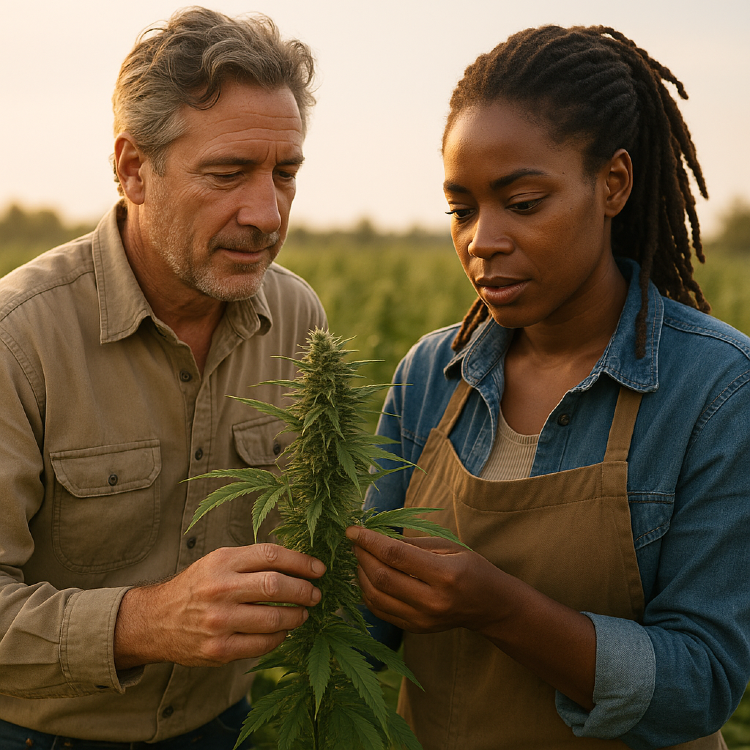Beyond Extraction: Building a Regenerative Cannabis Economy
What if success in cannabis meant healing, not just margins? A regenerative model redefines ROI—centering equity, ecology, and intergenerational repair. The future isn’t extraction. It’s circulation.

Imagine a cannabis industry where success isn't just measured in stores opened and products sold. Where metrics extend beyond quarterly earnings to track community impact, ecological regeneration, and intergenerational healing. Where the faces in executive suites and on cap tables reflect the diverse communities that preserved cannabis knowledge through decades of prohibition and prosecution.
This isn't utopian thinking—it's practical necessity. The extractive corporate cannabis model is already failing, collapsing under the weight of its own contradictions: promising quality while cutting corners, claiming authenticity while erasing culture, pledging equity while hoarding power.
Building a truly sustainable cannabis industry requires reimagining core assumptions about growth, scale, and success. It demands leadership fluent in both contemporary business strategy and legacy cannabis culture—seeing these not as opposing forces but as symbiotic elements of a coherent business philosophy.
What would this regenerative cannabis model look like in practice?
First, it would place genuine ownership and economic participation at its center, with at least 40% of company equity directed to communities harmed by cannabis criminalization. This isn't charity—it's recognition that today's commercial opportunities were built on yesterday's sacrifices. Companies would lock their social mission into their governance through cooperative structures, public benefit corporation charters, and community land trusts.
Second, it would reimagine the supply chain as a value circle, where cannabis businesses don't just extract from communities but circulate resources within them. Retailers would directly incubate small, minority-owned brands that stock their shelves. Cultivators would prioritize regenerative agricultural practices. Manufacturers would invest in waste reduction and circular packaging systems.
Third, it would transform key performance indicators to focus on holistic impact: second-chance hiring rates, living wages, local recidivism statistics, progress toward historical redlining reversal. The true bottom line would extend beyond financial statement to measure success through businesses launched, first-generation wealth created, neighborhoods stabilized, and healing made accessible.
These principles apply equally to established MSOs looking to course-correct and emerging craft operators building from the ground up. The challenge isn't company size but company values—the foundational assumptions about what cannabis businesses are for and whom they ultimately serve.
The encouraging news is that this regenerative model isn't theoretical. It's already emerging through companies like Viola, which integrates social equity into its core business model rather than treating it as a philanthropic afterthought. Or through incubators like Our Dream, creating pathways to ownership for entrepreneurs from communities disproportionately harmed by prohibition.
As the corporate cannabis bubble deflates, we stand at a pivotal moment of industry recalibration. We face a clear choice between doubling down on extraction or pioneering regeneration. Between continuing to view cannabis merely as another commodity to be monetized or recognizing it as a unique opportunity to demonstrate how business can heal rather than harm—economically, socially, and ecologically.
The path of regeneration requires both new narratives and new numbers. It demands we expand our definition of return on investment beyond short-term financial metrics to include long-term community resilience. It calls us to design business models that distribute rather than concentrate value, that repair rather than exploit, that cultivate patient capital instead of pursuing quick exits.
This isn't just moral imperative—it's market intelligence. As consumers grow increasingly sophisticated about greenwashing and equity-washing, companies that authentically embody values of sustainability and justice will secure the brand loyalty and cultural relevance that no marketing budget can buy. The regenerative cannabis model isn't just more ethical—it's more adaptive to an evolving marketplace where trust has become the scarcest and most valuable resource.
Corporate Cannabis is Eating Itself
MSOs didn’t bring legitimacy. They brought debt, dilution, and decades of cultural theft. Hype without heritage. Scale without soul.
This dossier lays out the full collapse: the boardroom delusions, the empty promises, and the path toward something real, rooted, and reparative.
No industry worship. No legacy erasure. Just receipts.
🧾 Every claim has a receipt. Check the source files, citations, and footnotes we weren’t supposed to find.
